Meal Prep Guide for Beginners is the ultimate solution for anyone looking to save time, eat healthier, and reduce stress in their weekly routine. If you’re new to meal prepping, this guide will walk you through simple, step-by-step strategies to help you get started.
As a busy mom or woman always on the go, finding time to prepare healthy meals can feel like an impossible task. Between work, family obligations, and trying to maintain some semblance of a social life, cooking often falls to the bottom of the priority list. But what if I told you there’s a way to eat healthier, save time, and reduce stress throughout the week? Enter the world of meal prepping. Here is a meal prep guide for beginners that will help you in your daily life.
What is Meal Prepping?
Meal prepping is the practice of planning and preparing meals or ingredients ahead of time. It’s a game-changer for anyone looking to eat healthier, save money, or simply reduce the daily stress of figuring out ‘what’s for dinner?’ If you’re new to meal prepping, check out this Beginner’s Guide to Meal Prep for additional tips and strategies.
As someone who used to dread the daily dinner dilemma, I can attest to the life-changing magic of meal prepping. It’s not about spending your entire Sunday in the kitchen (unless you want to!). Meal Prep Guide, Instead, it’s about finding a system that works for you and your lifestyle.
In this guide, we’ll cover everything you need to know to get started with meal prepping, including:
- Benefits of Meal Prepping
- Essential Tools and Equipment
- Planning Your Meals
- Grocery Shopping Strategies
- Prep Day: Step-by-Step
- Storage and Food Safety
- Reheating and Enjoying Your Meals
- Common Mistakes to Avoid
- Meal Prep guide for Beginners
Let’s dive in!
Benefits of Meal Prepping Meal Prep Guide

Before we get into the how-to, let’s talk about why meal prepping is worth your time:
- Save Time: While you’ll spend a chunk of time prepping, you’ll save hours throughout the week.
- Eat Healthier: When healthy meals are ready to go, you’re less likely to reach for junk food or order takeout.
- Save Money: Buying ingredients in bulk and reducing food waste can significantly cut your grocery bill.
- Reduce Stress: No more last-minute scrambling to figure out dinner.
- Portion Control: Pre-portioned meals can help with weight management goals.
- Variety: Contrary to popular belief, meal prepping doesn’t mean eating the same thing every day.
Essential Tools and Equipment
You don’t need a professional kitchen to meal prep effectively, but a few key tools can make the process much easier:
- Storage Containers: Invest in a good set of glass or BPA-free plastic containers in various sizes.
- Cutting Board and Sharp Knives: Quality knives make chopping and prepping much faster and safer.
- Measuring Cups and Spoons: For consistent portions and following recipes accurately.
- Slow Cooker or Instant Pot: These can be lifesavers for hands-off cooking.
- Sheet Pans: Great for roasting vegetables or cooking multiple items at once.
- Food Scale: Helpful for portion control and following recipes precisely.
Planning Your Meals

Effective meal prepping starts with a solid plan. Here’s how to get started:
- Choose Your Method: Decide if you want to prep full meals or just ingredients. Some people prefer to have complete meals ready to go, while others like to prep components to mix and match throughout the week.
- Plan Your Menu: Start with dinner ideas, then work backwards to lunch and breakfast. Consider your schedule for the week – maybe you need more quick-grab options on busy days.
- Keep it Balanced: Aim for a mix of proteins, complex carbohydrates, and vegetables in each meal.
- Use a Template: Create a simple meal planning template or use a digital app to organize your ideas.
- Start Small: If you’re new to meal prepping, start with just 2-3 days of meals. You can always scale up as you get more comfortable with the process.
Remember, the goal is to make your life easier, not to create more stress. It’s okay to include some convenience items or simpler meals in your plan.
Grocery Shopping Strategies
Once you have your meal plan, it’s time to hit the grocery store. Here are some tips to make your shopping trip efficient and budget-friendly:
- Make a Detailed List: Organize your list by store sections to avoid backtracking.
- Buy in Bulk: For items you use frequently, buying in larger quantities can save money.
- Shop the Sales: Plan your meals around what’s on sale that week.
- Consider Frozen Produce: It’s often cheaper and just as nutritious as fresh.
- Don’t Shop Hungry: You’re more likely to make impulse purchases on an empty stomach.
5. Prep Day: Step-by-Step
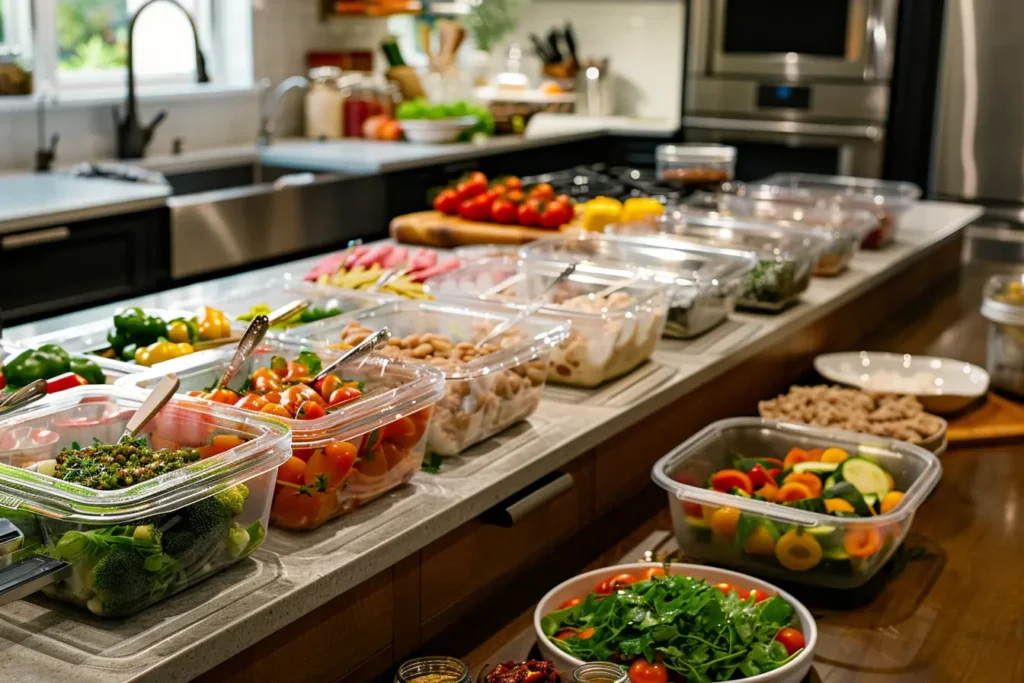
Now for the main event – prep day! Here’s a step-by-step guide to make your prep day as efficient as possible:
- Clean Your Kitchen: Start with a clean slate. Empty the dishwasher and clear your counters.
- Organize Your Ingredients: Gather all the ingredients you’ll need for your prep session.
- Start with Longer-Cooking Items: Get foods that take longer to cook, like roasted vegetables or slow cooker meals, started first.
- Multitask: While those items are cooking, start on tasks like chopping vegetables or cooking grains.
- Batch Similar Tasks: Chop all your vegetables at once, cook all your proteins together, etc.
- Use Time-Saving Appliances: Your slow cooker, Instant Pot, or rice cooker can be working while you focus on other tasks.
- Clean as You Go: This will make the final cleanup much less daunting.
- Cool Before Storing: Let foods cool to room temperature before packaging them for the fridge or freezer.
Remember, you don’t have to prep everything in one day. Some people prefer to split their prep over two days – for example, prepping ingredients on Saturday and cooking on Sunday.
Storage and Food Safety
Proper storage is crucial for keeping your prepped meals fresh and safe to eat:
- Invest in Quality Containers: Glass or BPA-free plastic containers with secure lids are best.
- Label Everything: Include the contents and date prepared.
- Use the “First In, First Out” Method: Eat older meals first to reduce waste.
- Know Food Safety Guidelines: Generally, most prepped meals last 3-5 days in the fridge. If you’re prepping further ahead, consider freezing some meals.
- Freeze Properly: Leave space in containers for food to expand when frozen.
Reheating and Enjoying Your Meals
The whole point of meal prepping is to make your life easier, so don’t forget about the enjoyment factor:
- Reheat Safely: Use the microwave, stovetop, or oven depending on the dish. Make sure foods reach a safe internal temperature.
- Add Fresh Elements: Sprinkle on some fresh herbs, a squeeze of lemon, or a dollop of yogurt to brighten up prepped meals.
- Mix and Match: If you prepped components rather than full meals, have fun creating different combinations throughout the week.
Common Mistakes to Avoid
As a meal prep beginner, with our meal prep guide you will watch out for these common pitfalls:
- Prepping Too Much: Start small and work your way up.
- Not Enough Variety: Eating the same thing every day can lead to boredom.
- Ignoring Food Safety: Always follow proper food handling and storage guidelines.
- Forgetting About Texture: Some foods don’t hold up well for multiple days. Plan accordingly.
- Not Adjusting Your Plan: If something isn’t working, don’t be afraid to change it up.
Meal Prep Ideas for Meal Prep Guide Beginners
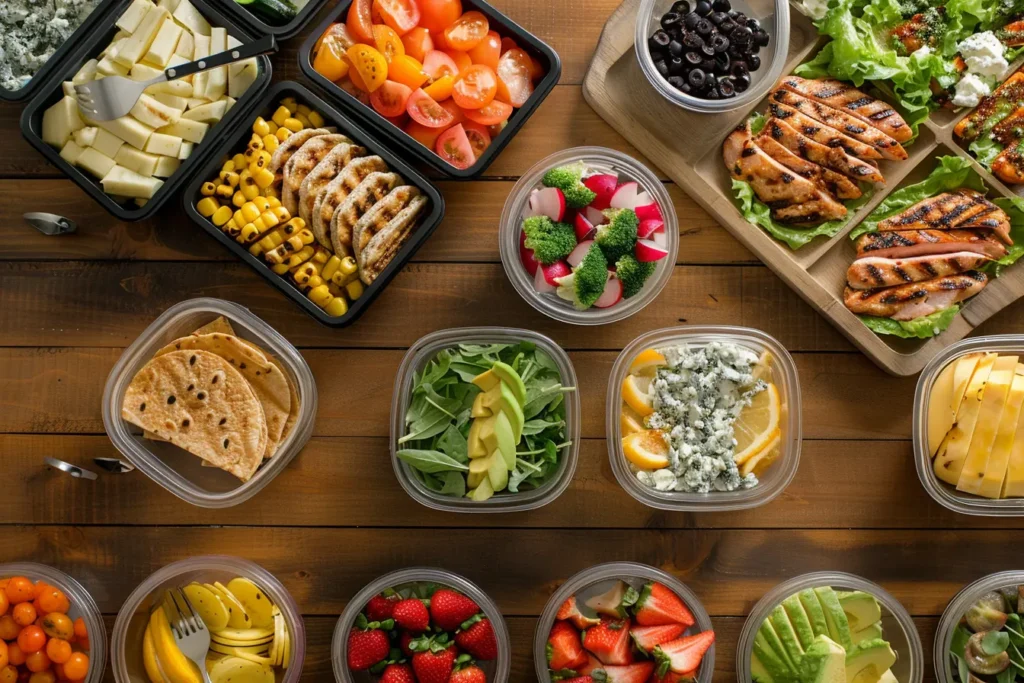
Ready to get started? Here are some simple meal prep ideas perfect for beginners:
Breakfast:
- Overnight oats with fruit and nuts
- Egg muffins with vegetables
- Greek yogurt parfaits
Lunch:
- Salad in a jar (dressing on the bottom, greens on top)
- Burrito bowls with rice, beans, and veggies
- Wraps with turkey and cheese
Dinner:
- Sheet pan chicken and roasted vegetables
- Slow cooker chili or soup
- Stir-fry with pre-chopped vegetables and cooked rice
Snacks:
- Cut vegetables with hummus
- Apple slices with peanut butter
- Hard-boiled eggs
Remember, the key is to start simple and build from there. As you get more comfortable with meal prepping, you can experiment with more complex recipes and techniques.
Conclusion of Meal Prep Guide
Meal prepping might seem daunting at first, but with a little practice of this meal prep guide, it can become a simple and enjoyable part of your routine. The time and stress you’ll save during the week make it well worth the effort.
Start small, be patient with yourself, and don’t be afraid to adjust your approach as you figure out what works best for you. Before you know it, you’ll be a meal prep guide pro, enjoying delicious, healthy meals all week long without the daily stress of cooking.
Remember, the goal of meal prepping is to make your life easier and healthier. It’s not about perfection – it’s about progress. So grab those containers, fire up that slow cooker, and get prepping! Your future self will thank you.
Do you have any favorite meal prep recipes or tips? Share them in the comments below – we’d love to hear from you!
Want more time-saving cooking tips? Check out our 5-Ingredient Weeknight Dinners and 15-Minute Meals for Busy Moms posts for more quick and easy meal ideas!
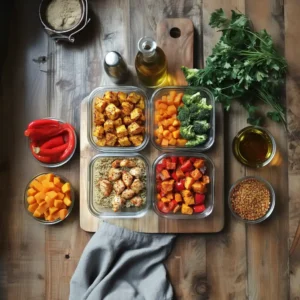
Easy Meal Prep Chicken and Veggies
Ingredients
For the Chicken:
- 2 large boneless skinless chicken breasts (about 1 lb)
- 2 tbsp olive oil
- 1 tsp garlic powder
- 1 tsp paprika
- ½ tsp salt
- ½ tsp black pepper
For the Vegetables:
- 2 cups broccoli florets
- 1 red bell pepper diced
- 1 cup sweet potato diced
- 2 tbsp olive oil
- 1 tsp Italian seasoning or your favorite herb blend
- ½ tsp salt
- ½ tsp black pepper
For the Base:
- 2 cups cooked quinoa or brown rice
Optional Add-Ons:
- Lemon wedges for garnish
- ½ cup teriyaki sauce or garlic yogurt sauce for dipping or drizzling
Instructions
Prep Ingredients:
- Preheat oven to 400°F (200°C).
- Dice boneless, skinless chicken breasts into bite-sized pieces.
- Chop vegetables like broccoli, bell peppers, and sweet potatoes into even chunks.
- Cook 2 cups of quinoa or brown rice separately.
Season and Arrange:
- Toss the chicken with olive oil, salt, pepper, garlic powder, and paprika.
- Season vegetables with olive oil, salt, pepper, and Italian seasoning.
- Arrange chicken on one half of a baking sheet and vegetables on the other half.
Bake:
- Bake for 20–25 minutes or until chicken is cooked through (165°F internal temperature) and vegetables are tender.
Assemble:
- Divide cooked quinoa or brown rice into meal prep containers.
- Add portions of baked chicken and roasted vegetables to each container.
Notes
- Customize vegetables with your favorites, such as zucchini, asparagus, or carrots.
- Add a dipping sauce, like teriyaki or garlic yogurt, for extra flavor.

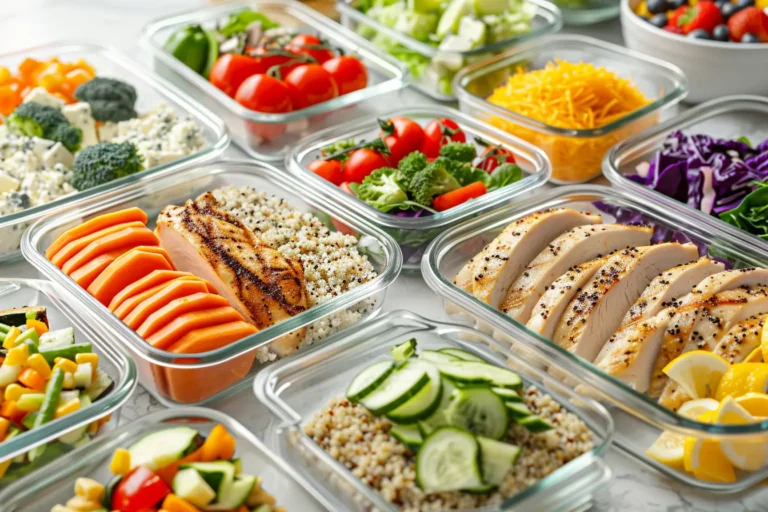
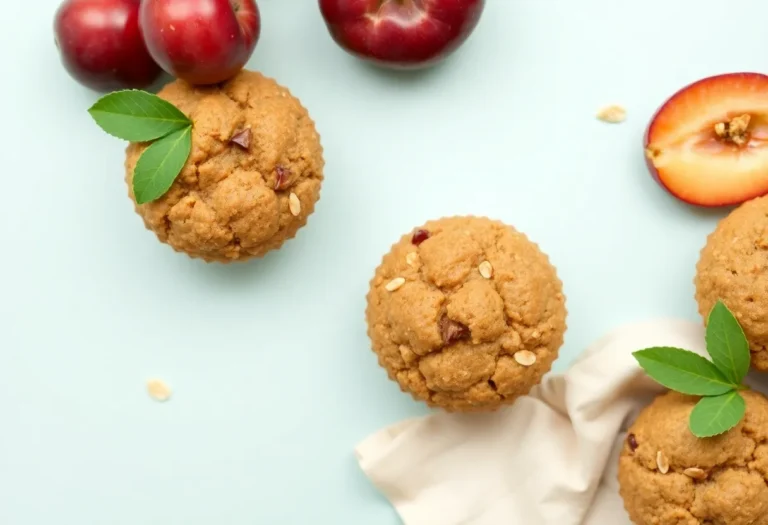
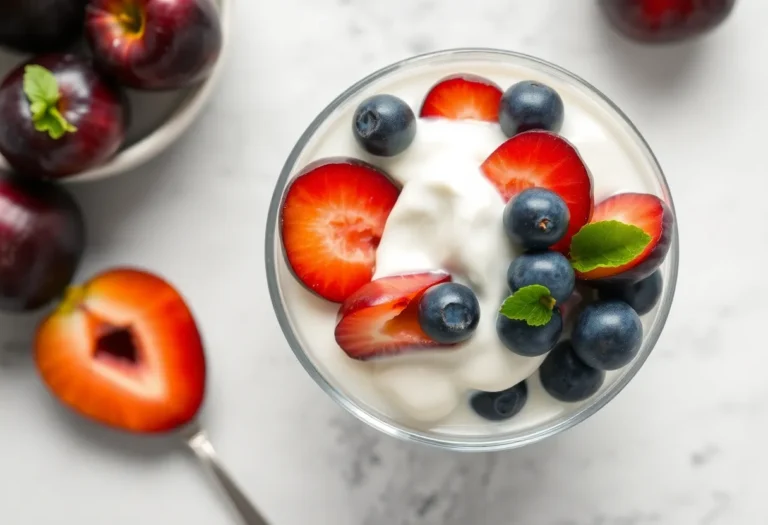

Hi there, its pleasant article on the topic of media print, we all
know media is a enormous source of data.